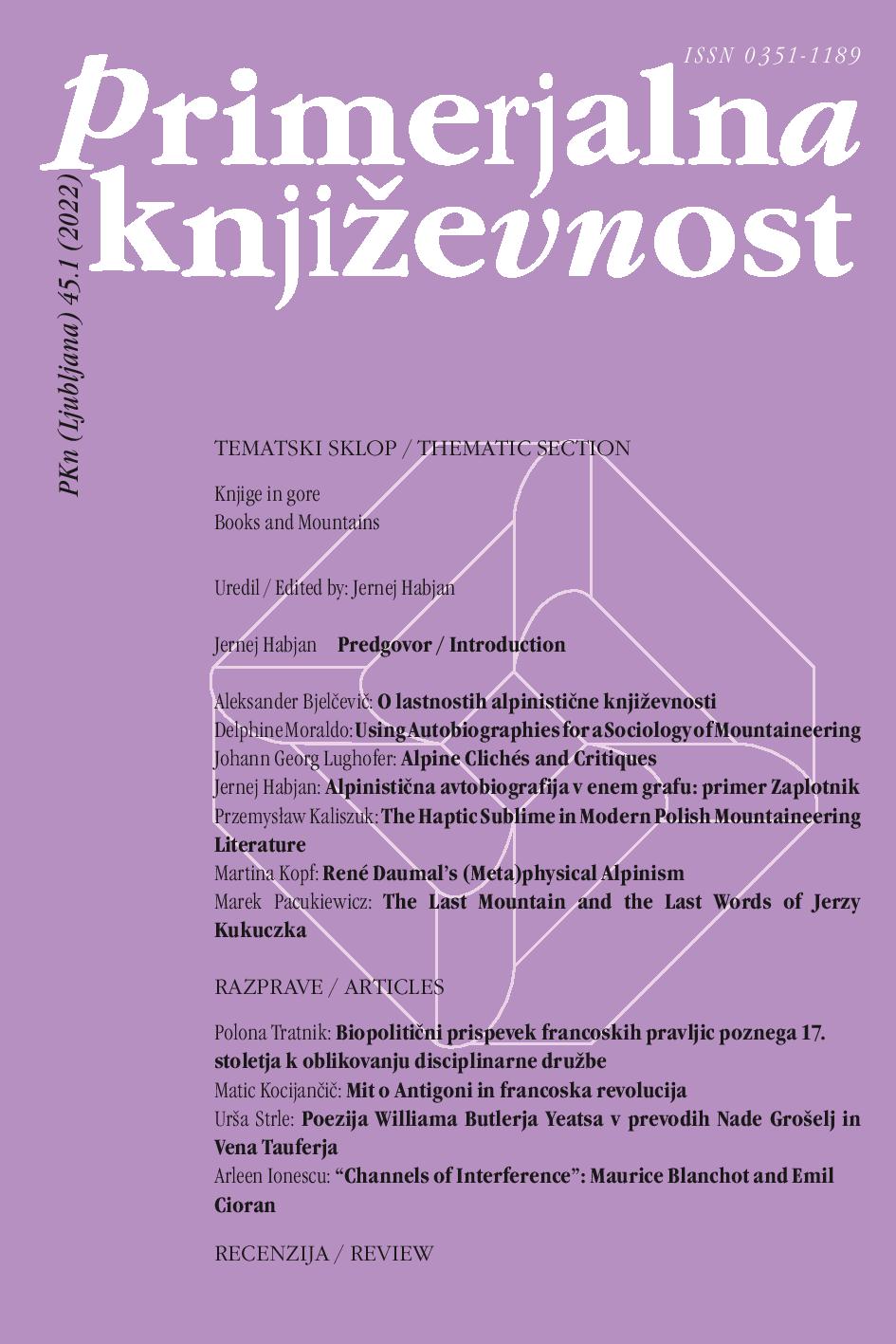“What the Mountain Taught Me This August”: René Daumal’s (Meta)physical Alpinism
DOI:
https://doi.org/10.3986/pkn.v45.i1.06Keywords:
literature and alpinism, French literature, mountaineering literature, Daumal, René, esoterism, change of consciousness, Gurdjieff, George I.Abstract
French writer René Daumal’s (1908–1944) unfinished novel, Mount Analogue (Le Mont Analogue, 1952), tells of a group of mountaineers who set out to find an invisible mountain, the Analogue. All mountains have lost their analogical power, and thus a new mountain is needed. Daumal’s mountain serves a metaphysical goal and is linked to the desire for a change of consciousness, to be achieved through conquering the mountain. Even as a student, Daumal sought to expand his consciousness, not only through experimenting with drugs but also by means of sleep deprivation and somnambulism. In this regard, he was influenced by the Russian-Armenian esotericist George I. Gurdjieff (1866?–1949). Gurdjieff dealt with altered states of consciousness; he believed that the real world is hidden from us behind the wall of our imagination and that we therefore live a mechanical existence that we must break up by reaching our authentic selves. Mount Analogue is about this change of consciousness, and its ascent can be regarded as a metaphysical adventure. Daumal was also a passionate mountaineer who viewed mountains as a source of inspiration, stimulation, and physical adventure, but also as a place for recreation where he could rest his brain and heal his body, which was ill with tuberculosis. The idea for Mount Analogue came to him during a stay in the Alps in 1937. This contribution traces the genesis of Mount Analogue as an interplay between a physical and a metaphysical adventure.
References
Biès, Jean. <em>René Daumal</em>. Paris: Éditions Seghers, 1973.
Daumal, René. <em>Mount Analogue: A Novel of Symbolically Authentic Non-Euclidean Adventures in Mountain Climbing</em>. Trans. Roger Shattuck. London: Pantheon, 1959.
Daumal, René. “A Jack Daumal (Gavarnie, septembre 1940).” <em>Argile</em> 13–14 (1977): 199–211.
Daumal, René. <em>Correspondance, I: 1915–1928</em>. Eds. H. J. Maxwell and Claudio Rugafiori. Paris: Gallimard, 1996.
Daumal, René. <em>Correspondance, III: 1933–1944</em>. Eds. H. J. Maxwell and Claudio Rugafiori. Paris: Gallimard, 1996.
Daumal, René. “Le Mont Analogue. Roman d’aventures alpines, non euclidiennes et symboliquement authentiques.” <em>Les Monts Analogues de René Daumal</em>. Ed. Boris Bergmann. Paris: Gallimard, 2021. 49–124.
Dermenghem, Emile. “Souvenir de René Daumal.” <em>Cahiers du Sud</em> 32.272 (1945): 509–510.
Dranty, Billy. “Daumal alpiniste.” <em>Les Monts Analogues de René Daumal</em>. Ed. Boris Bergmann. Paris: Gallimard, 2021. 31–47.
Eliade, Mircea. <em>Traité d’histoire des religions</em>. Paris: Gallimard, 1959.
Ferrick Rosenblatt, Kathleen. <em>René Daumal: The Life and Work of a Mystic Guide</em>. Albany, NY: State University of New York Press, 1999.
Kopf, Martina. <em>Alpinismus—Andinismus. Gebirgslandschaften in europäischer und lateinamerikanischer Literatur</em>. Stuttgart: Metzler, 2016.
Kopf, Martina. “Berg und Bewusstseinsveränderung: René Daumals <em>Le Mont Analogue</em> und Alejandro Jodorowskys <em>The Holy Mountain</em>.” <em>Der Traum vom Berg</em>. Ed. Sophia Mehrbrey. Stuttgart: Fink-Verlag, 2022 (forthcoming).
Magee, Glenn Alexander. “G. I. Gurdjieff and the Fourth Way.” <em>The Cambridge Handbook of Western Mysticism and Esotericism</em>. Ed. Glenn Alexander Magee. Cambridge; New York, NY: Cambridge University Press, 2016. 284–296.
Rousseaux, André. <em>Littérature du vingtième siècle</em>. Paris: Albin Michel, 1955.
Tonet, Aureliano. “Le livre fétiche de François Mitterrand.” <em>Le Monde</em>. 11 August 2021. 22.


